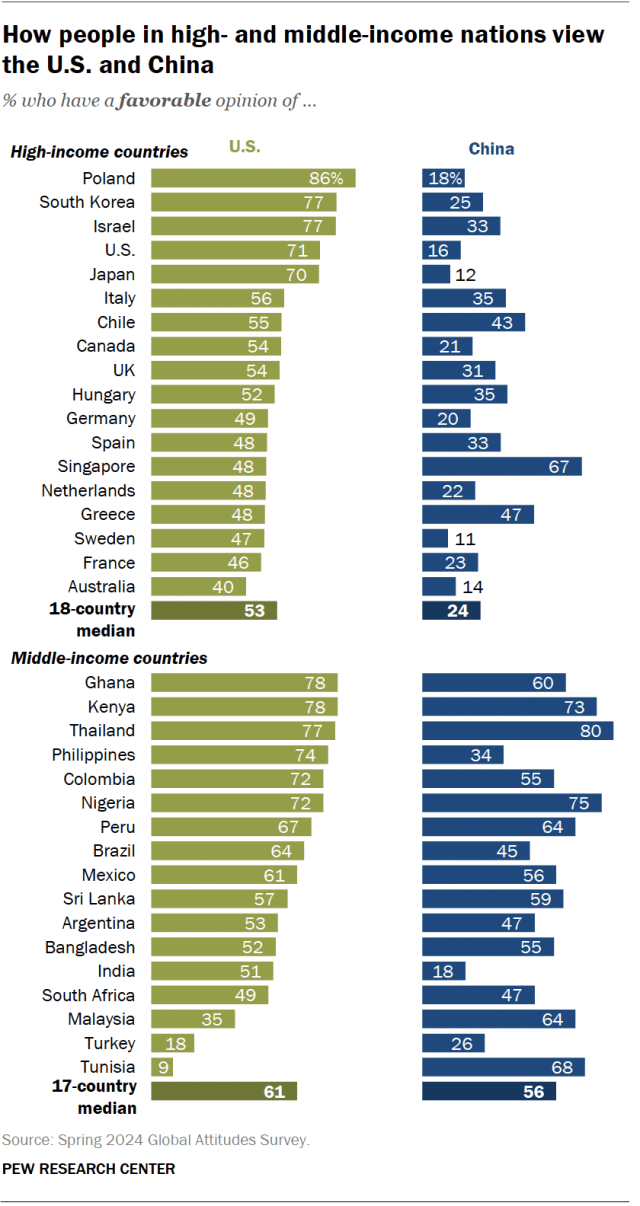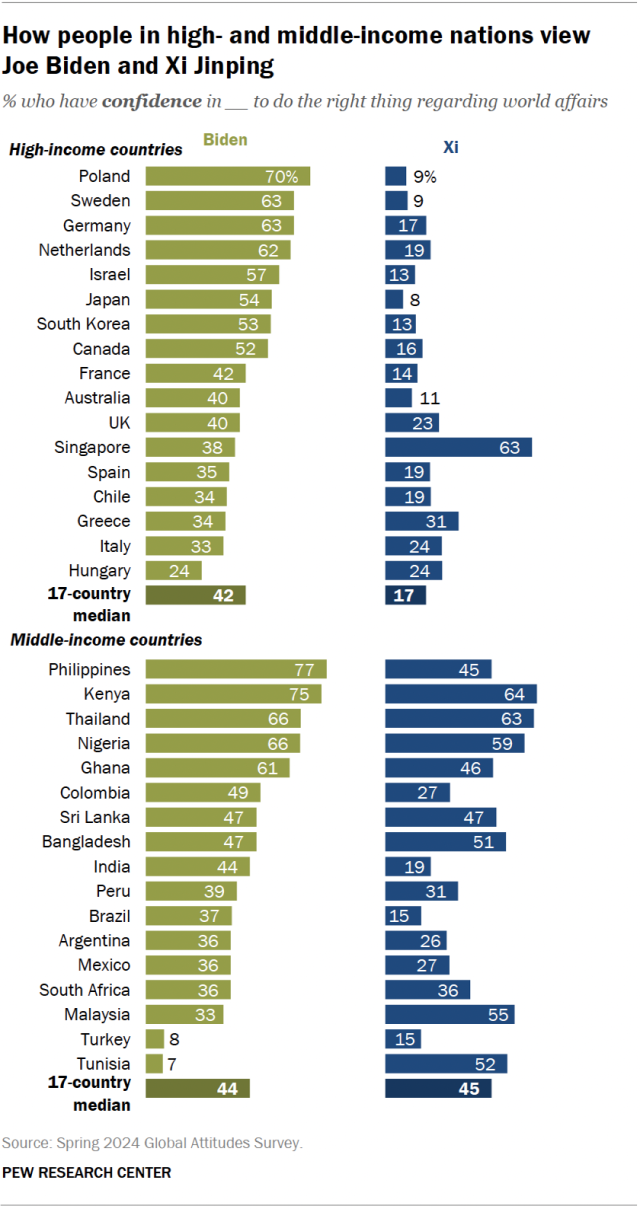More people around the world have a positive view of the United States than China, according to a Pew Research Center survey of 35 countries. A median of 54% of adults in these nations have a favorable view of the U.S., while a median of 35% see China favorably.
This Pew Research Center analysis explores public opinion of the U.S. and China in 35 countries in North America, Europe, the Asia-Pacific region, the Middle East-North Africa region, sub-Saharan Africa and Latin America. Data on public confidence in U.S. President Joe Biden is limited to 34 countries because we did not ask this question in the United States.
This analysis draws on nationally representative surveys of 40,566 adults conducted from Jan. 5 to May 21, 2024. All surveys were conducted over the phone in Canada, France, Germany, Greece, Italy, Japan, Malaysia, the Netherlands, Singapore, South Korea, Spain, Sweden and the United Kingdom. Surveys were conducted face to face in Argentina, Bangladesh, Brazil, Chile, Colombia, Ghana, Hungary, India, Israel, Kenya, Mexico, Nigeria, Peru, the Philippines, Poland, South Africa, Sri Lanka, Thailand, Tunisia and Turkey. In Australia, we used a mixed-mode probability-based online panel.
In the United States, we surveyed 3,600 U.S. adults from April 1 to April 7, 2024. Everyone who took part in this survey is a member of the Center’s American Trends Panel (ATP), an online survey panel that is recruited through national, random sampling of residential addresses. This way nearly all U.S. adults have a chance of selection. The survey is weighted to be representative of the U.S. adult population by gender, race, ethnicity, partisan affiliation, education and other categories. Read more about the ATP’s methodology.
We base our classifications of high- and middle-income countries on the World Bank’s designations.

Views of the U.S. are broadly positive across the high- and middle-income countries we surveyed between January and May:
- A median of 53% in 18 high-income countries have a favorable view of the U.S.
- A median of 61% in 17 middle-income countries also see the U.S. favorably.
Favorability ratings of the U.S. range from a high of 86% in Poland to a low of 9% in Tunisia. And 71% of Americans themselves have a positive view of their country.
When it comes to China, people in high- and middle-income countries have markedly different opinions:
- In the high-income countries surveyed, a median of just 24% have a favorable view of China.
- Far more in middle-income nations (a median of 56%) see China positively.
Indeed, there’s only one high-income country where a majority of adults have a favorable opinion of China – Singapore, where 67% hold this view. By comparison, majorities are favorable in more than half of the middle-income countries surveyed.
When it comes to differences in views of the U.S. and China, a few countries stand out:
- More people have a favorable opinion of China than the U.S. in Malaysia, Singapore, Tunisia and Turkey.
- Views of the U.S. and China are broadly similar (and mostly favorable) in Bangladesh, Greece, Nigeria, Peru, South Africa, Sri Lanka and Thailand.
- More people have a positive view of the U.S. than China in the remaining 24 countries we surveyed. In some of these places, such as Kenya and Mexico, people are only slightly more likely to favor the U.S. over China. In other places, such as Japan and South Korea, far more people view the U.S. favorably than hold the same view about China.
Opinions of the U.S. and China have fluctuated somewhat since last year in the 22 countries where 2023 trend data is available. But there is only one – Spain – where views of the U.S. have become more negative while views of China have become more positive. Elsewhere, views of only one country have shifted significantly. And in Israel, views of both the U.S. and China have become more negative.
Confidence in Biden and Xi

People in the surveyed countries also tend to have more confidence in U.S. President Joe Biden than Chinese President Xi Jinping to do the right thing regarding world affairs. A median of 43% of adults across 34 countries (excluding the U.S.) have confidence in Biden, compared with a median of 24% who have confidence Xi.
Again, there are major differences in views between high- and middle-income countries:
- In the high-income countries surveyed, a median of 42% of adults have confidence in Biden, while 17% have confidence in Xi.
- In middle-income countries, nearly identical shares have confidence in Biden and Xi (44% vs. 45% at the median).
Malaysia, Singapore, Tunisia and Turkey are the only surveyed countries where more people have confidence in Xi than Biden.
In most other countries, more people have confidence in Biden than Xi. In fact, in several of these countries – including Germany, Japan and South Korea – people are at least 40 percentage points more likely to have confidence in the American president than in his Chinese counterpart.
